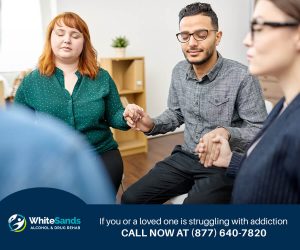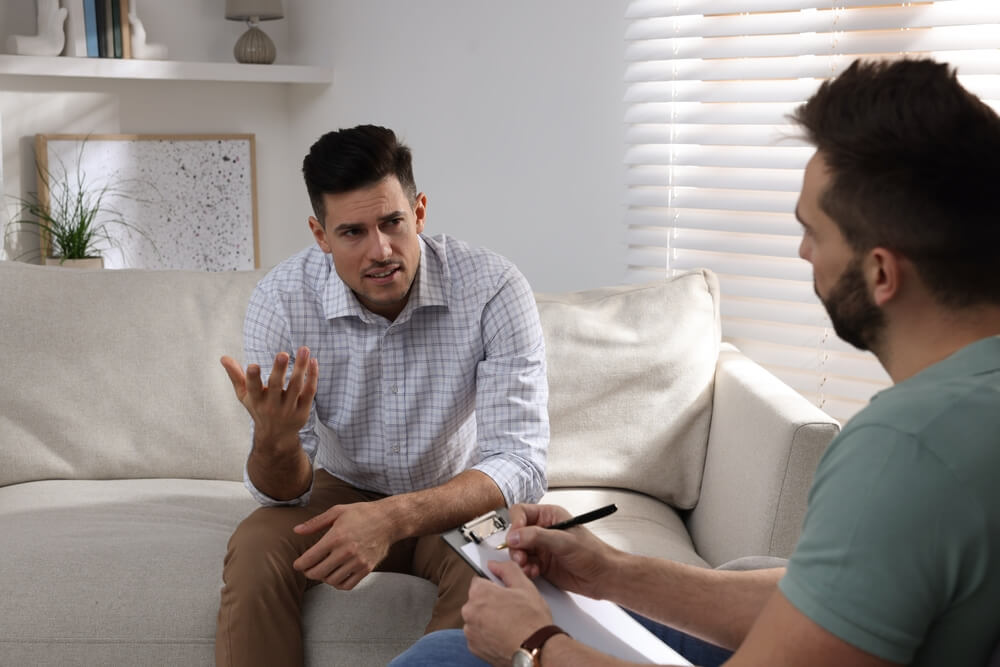Yoga and Meditation: How It Can Help in Addiction Treatment and Recovery

The Intersection of Yoga and Meditation: Complementary Practices in Recovery
Living with a substance use disorder, even for a short time, can make alterations to your mind and your body that cause profound changes to the way you think, feel, and behave. These changes can make it difficult to see beyond the addiction, and they can cause you to feel extreme anxiety, depression, and fear. You may start to think and believe negative, unhelpful thoughts that can get in the way of your recovery.
Choosing an addiction treatment program that involves complementary practices like yoga, meditation, and other spiritual practices in addition to behavioral therapy and group sessions may help make it easier to keep your spirits high and your body feel better as you work on taking control back over your life.
At WhiteSands, we harness the benefits of yoga and meditation, amongst other practices, to ensure that our patients have the most positive, comfortable, and peaceful experience possible. The aim is to ensure each guest can relax and focus on their recovery in our luxury rehabilitation center, through a variety of helpful treatments provided within a comfortable and supportive environment.
Benefits of Yoga in Addiction Treatment
Yoga is a practice that has been in use around the world for over 5,000 years, with its origins traced back to northern India. It is a spiritual discipline that focuses on bringing harmony to the mind and body through breath control and using slow, controlled movements. The goal of yoga is to reduce suffering and reach a state of freedom of the mind, using a practice that feels liberating, peaceful, and healthy.
For people who have been using drugs and alcohol, yoga can bring their attention back to the way their body feels while giving them the power to help themselves. Yoga builds strength and resilience, reduces stress, calms the mind, and reinforces the mind-body connection, A regular yoga practice can also build a person’s self-confidence as they grow stronger and more flexible over time.
A long-term benefit of learning yoga is that you can do it almost anywhere, for free, whenever you like. It is a powerful tool to have in your relapse-prevention tool belt, as it works as a healthy outlet during stressful times. Anybody can use yoga to center themselves, stay healthy and fit, and imbue any day with a few moments of relaxation.
Meditation’s Role in Supporting Recovery
Meditation, in simple terms, is a way to clear your mind, reduce anxiety, and feel better. You can use a variety of methods to achieve this state, including both mental and physical techniques like deep breathing, mindfulness meditation, or guided meditation.
In recovery, meditation can be used to help balance emotions, reduce mental pain and stress, and introduce mental calmness during difficult periods. When used as part of an integrated, complementary practice during rehab, it can help to keep things in perspective, reduce unhelpful thoughts, make treatments easier, and reduce withdrawal symptoms like high blood pressure and insomnia. It is especially useful in cases where the person has a dual diagnosis, with mental health conditions like PTSD, anxiety, or depression.
Yoga vs. Meditation: Understanding Their Unique Contributions

Because yoga and meditation are often lumped together, you may have found yourself wondering “Is yoga meditation? What is the difference between yoga vs. meditation?” Yoga is the stretching and movement of the body, while meditation is something you can do in your mind while lying still or walking around if you wish. They are not the same thing but are often used together to reduce stress and pain and to achieve a sense of peace in the mind and body.
Those who do yoga will often use meditation as a way to relax the mind and body, to become in tune with their breathing, and to focus on the now, rather than allowing their thoughts to return to painful or unhelpful places.
Integrating Yoga and Meditation into a Holistic Recovery Plan
While yoga, meditation, and other holistic practices like nutritional counseling, recreation, mindfulness, and exercise programs are not going to make your substance use disorder go away, they can certainly add a lot of benefits to your treatment plan, and better help you overcome addiction long-term.
Addiction treatment needs to have a foundation of evidence-based treatments and therapies, and medical oversight is often necessary as well. These types of care can only be administered by licensed, certified individuals, within a safe and accredited treatment center. Common evidence-based treatments used in the treatment of a substance use disorder may include:
- Cognitive behavioral therapy
- Dialectical behavior therapy
- Rational emotive behavior therapy
- Family therapy
- Motivation therapy
- EMDR
- Contingency management and relapse prevention programs
- Life skills training
- Group and individual counseling sessions
- 12-step groups and further peer support
These types of treatment have been proven time and time again to be effective in treating substance use disorders, often in conjunction with medical care, prescription psychiatric medications, and holistic methods including yoga and meditation.
Getting Started with Yoga and Meditation in Recovery
You don’t need to be a professional yogi (or even physically fit, or spiritual) to reap the benefits of yoga and meditation. Simply putting yourself into gentle, restorative yoga positions, getting into an open and peaceful headspace, and allowing yourself to relax can do wonders for your well-being. It certainly can’t hurt you to try it out, and you may find that you like it!
When you first start, you should take it slow and listen to your body’s signals. It takes patience, dedication, and consistency to progress in yoga. At WhiteSands, we provide beginner’s lessons in welcoming group classes that you are free to join if you wish. These are low-pressure, with no expectation on you to know what you are doing. There is also plenty of space for well-versed yoga and meditation enthusiasts, so if you are years into your practice, you can continue working on your health and fitness at your own pace.
WhiteSands Treatment’s Approach to Incorporating Yoga and Meditation
At WhiteSands, our evidence-based programs feature the full continuum of care, leading from your first day of medical inpatient detox, through residential rehab and beyond into a tailored outpatient program designed to work best for your practical needs.
During inpatient rehab, you will stay in a private room, with a private bathroom, eating nutritious food that is prepared on-site. Your days will be filled with therapy, counseling, and other programming designed to treat your substance use disorder, and in the evenings, you become our guest. In your free time, you can choose to partake in yoga, meditation, beach group meetings, artistic therapy, boxing lessons, social activities, spa treatments, movie nights, working out in the gym, sports, swimming, or going for a peaceful walk on your own.
We understand the benefits of yoga and meditation. Incorporating these complementary practices into a holistic treatment plan can reduce fear, anxiety, pain, and withdrawal symptoms while enhancing recovery. This is why we offer the option to include these practices in your customized care plan, amongst other luxurious amenities and programs.
To find out more about our luxury programs that incorporate the mind, body, and spirit together in a personalized holistic healing program, please call WhiteSands today at (877) 855-3470. If you are ready to get started, we can begin the admittance process immediately. We are also available to answer any questions you may have or check your insurance coverage for you. The time to start is now.
If you or a loved one needs help with abuse and/or treatment, please call the WhiteSands Treatment at (877) 855-3470. Our addiction specialists can assess your recovery needs and help you get the addiction treatment that provides the best chance for your long-term recovery.
